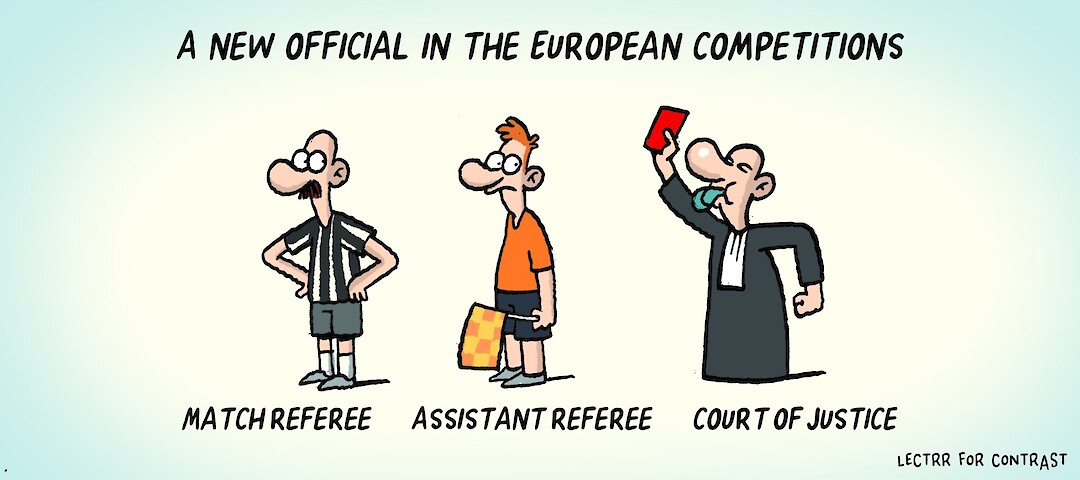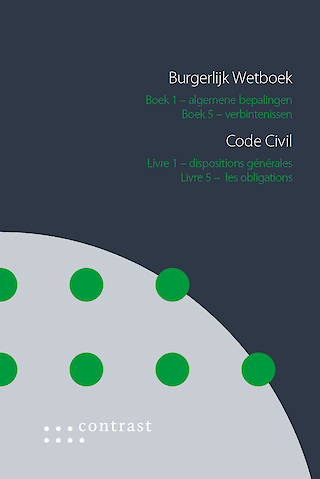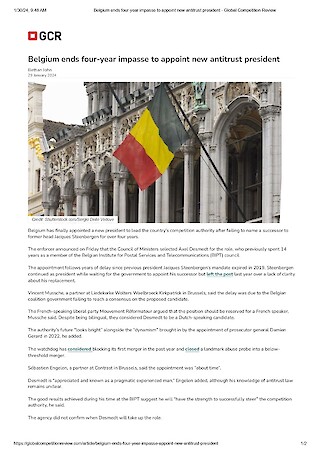In the Picture

Yellow card for sports federations
January 2024As the year 2023 drew to a close, the Court of Justice of the European Union gave an early Christmas present to practitioners when it handed down three important and long-awaited judgments on the relationship between sport and EU competition law in late December. In this edition of In the Picture, we will summarise for you the background and key takeaways of these sports judgments.
Background.
The first case, which made headlines around Europe, concerns the Superleague, an international competition announced in April 2021 by some major European football clubs that would compete with UEFA's Champions League.
As soon as the project was made public, FIFA and UEFA announced that they would not approve this competition and would impose sanctions on participating clubs and players. This led to a dispute before the Madrid Commercial Court, which referred questions to the Court of Justice about the relationship between FIFA and UEFA rules on the approval of new competitions, EU competition law and the principle of freedom to provide services.
Superleague is very similar to the second case, the International Skating Union (ISU) case, about a long-running dispute between two skaters and the ISU. The ISU had suspended the skaters for life from participating in international skating competitions organised by the ISU because they had participated in third-party competitions that the ISU had not approved.
The European Commission had already ruled in 2017 that the ISU had violated EU competition law in doing so. Indeed, the ISU's rules and sanctions allowed it to prevent organisers of competing international competitions from entering the market and also to deprive skaters from participating in such competitions. The ISU had appealed to the General Court, which largely upheld the Commission's decision in December 2020. Subsequently, the ISU appealed to the Court of Justice.
Finally, the third case concerns football club Antwerp, which is contesting the legality of UEFA and the Belgian Football Association's Homegrown Player Rule. This rule states that a minimum number of football players trained within a club in the national competition must be on the match sheet.
Concretely.
So what are the key takeaways? In our opinion, these are the four most important lessons from the three cases.
1. The "specificity of sport" is recognised but limited in scope
The key question in the Superleague and ISU judgments was whether EU competition law applies to rules of sports federations. Since the 1980s, a so-called "sports exception" has emerged under which it has been considered that purely sporting rules fall outside the scope of EU competition law. Purely sporting rules are those adopted by federations for exclusively non-economic reasons, and which concern questions that only relate to the sporting discipline as such, e.g. rules that exclude foreign players from national teams for country competitions, or that set the ranking criteria to select athletes.
Apart from this sports exception, sports federations such as FIFA, UEFA and ISU must comply with EU competition law. They are associations of undertakings and their rules on the participation of clubs and professional athletes in sports competitions are decisions by associations of undertakings within the meaning of EU competition law.
The Court does clarify that sport is a distinct economic activity which requires sports federations to be able to adopt rules relating to the organisation of competitions in their discipline, the proper running of those competitions, and the participation of athletes and clubs in those competitions. The Court considers it legitimate that the organisation and conduct of professional international competitions are subject to common rules in order to ensure the uniformity and coordination of those competitions within an umbrella calendar and, more generally, to appropriately promote the organisation of sports competitions based on equal opportunity and merit.
In other words, and this is an important novelty, the Court does not object in principle to sports federations having rules for the prior approval of competitions, possibly accompanied by sanctions. However, such rules must be subject to competition law, which has a significant impact on their content and implementation.
2. Towards a ‘super special responsibility' of sports federations
Dominant undertakings and associations of undertakings have a "special responsibility" not to prejudice effective and undistorted competition in the internal market. FIFA, UEFA and ISU have a dominant position for organising international sports competitions in their discipline.
What is new in the Superleague and ISU judgements is the introduction of what appears to be a "super special responsibility" for sports federations which, on the one hand, operate as sports regulators and, on the other hand, carry out economic activities consisting of organising sports competitions, for which they have a dominant, if not monopolistic, position.
Such a conflict of interest requires appropriate obligations, restrictions and judicial review to prevent a sports federation from abusing its regulatory powers to oppose new competitions without legitimate justification, thereby favouring its own competitions and denying market access to competitors.
The Court thus condemns rules of sports federations that give them the power to approve sports competitions, if those rules are not accompanied by restrictions, obligations and judicial review that exclude the risk of abuse of a dominant position. These rules should be framed by substantive criteria and procedural modalities that are transparent, objective, precise and non-discriminatory.
The rules of FIFA, UEFA and ISU are not circumscribed by such substantive criteria and procedural modalities. They therefore constitute an abuse of a dominant position and a by object restriction of competiton. This means that they are so harmful to competition that their effects need not be examined.
In summary, and contrary to some claims, the Court thus did not decide to approve the Superleague. Instead, the Court clarified that EU competition law requires sports federations with a conflict of interest, such as FIFA, UEFA and ISU, to adapt their regulations and procedures. If they fail to do so, the right they reserve for themselves to approve competing competitions constitutes an abuse of a dominant position.
3. A fuse under CAS sports arbitration
In ISU, another key point of discussion was that of mandatory sports arbitration before the Court of Arbitration for Sport ("CAS") and whether or not such mandatory CAS arbitration reinforced ISU's anti-competitive rules.
The CAS is based in Lausanne, Switzerland, i.e. outside the EU. It is an arbitration body whose members are appointed by the international sports federations. CAS rulings can only be appealed to the Swiss Supreme Court. This court does not apply EU competition law and, like the CAS, it is not a court that can make preliminary ruling requests to the Court of Justice.
The mandatory recourse to CAS is a common but often criticised practice in the sports world, for example because some believe that sports federations want to use it to escape from the application of EU law.
The Court of Justice confirmed in ISU that compulsory recourse to CAS is indeed incapable of ensuring effective compliance with the public policy provisions of EU law (including EU competition law). It also fails to meet the requirement of effective judicial review, a fundamental principle of EU law.
The Court of Justice is thus lighting a fuse under sports arbitration and opening a debate that will continue into 2024. For example, the FC Seraing case challenges FIFA's ban on "Third Party Ownership" in football in the light of European law, as well as the independence and jurisdiction of the CAS. On 8 September 2023, the Belgian Court of Cassation referred two preliminary ruling requests to the Court of Justice on whether the CAS can be granted the right to decide by res judicata whether or not European law has been violated.
4. The legality of the Homegrown Player Rule is far from established
Finally, in the Homegrown Player Rule case, the Court recognised that the aim of promoting the recruitment and training of young professional footballers was a legitimate public interest objective. In principle, this objective can justify a restriction on the free movement of workers.
However, the Court doubts whether the rule requiring a minimum number of homegrown players to be registered on the match sheet is appropriate to ensure the achievement of the objective (the attraction and training of young professional footballers at a local level) in a coherent and systematic manner and does not go beyond what is necessary to achieve that objective. It is for the national court to judge that.
The Court holds that the national court must examine, in particular, whether the disputed rule generates sufficient incentives for certain clubs (in particular those with significant financial resources) to recruit and train young footballers themselves. Indeed, they are free not to train any young player, but to limit themselves to acquiring them from a training club belonging to the same federation.
Yellow card for sports federations
The gist of the EU Court of Justice's sports judgments is as follows:
- Sports federations with a dual capacity as sports regulators and economic players, often with a dominant or even monopolistic position, for organising international sports competitions must comply with EU competition law.
- They abuse their dominant position when they reserve the right to approve third-party competitions, while the approval procedure is not framed by substantive criteria and procedural modalities that are transparent, objective, precise and non-discriminatory.
- CAS' hold on sports arbitration is seriously questioned for disputes involving EU competition law.
- The legality of the rule of the Homegrown Player Rule in football will soon be decided. That decision will fall in Belgium.
Want to know more?
The three ECJ rulings can be accessed via these links:
The judgment of the Belgian Court of Cassation, in which it referred new preliminary ruling requests to the Court of Justice on the CAS's competence to apply and interpret European law, can be accessed via this link (available in French only).
Please consult our website or contact one of our team members if you have questions or require more information:












